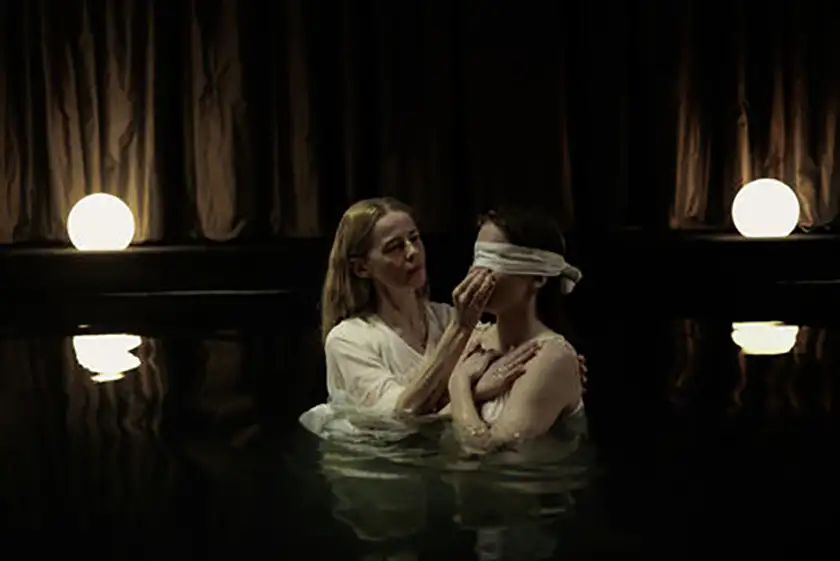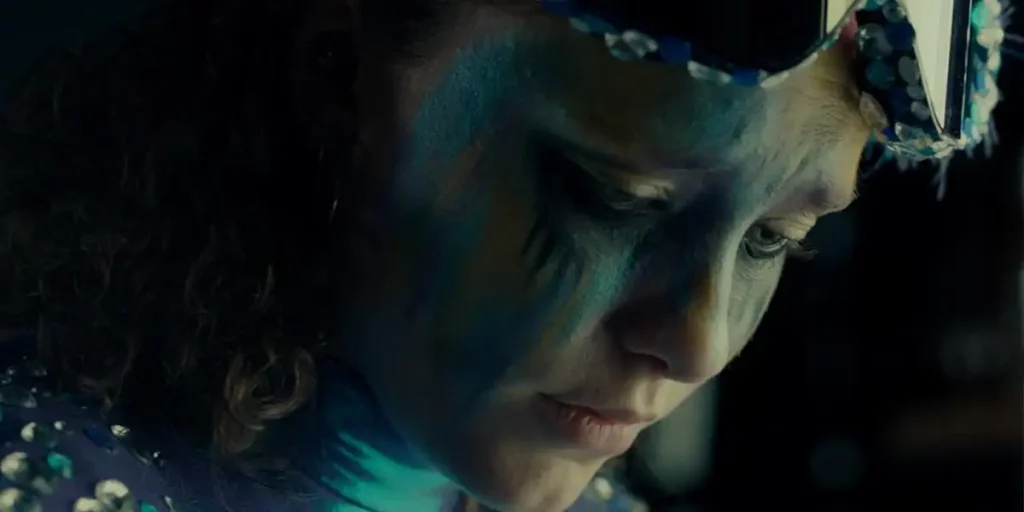Natatorium features stellar acting and a truly grim story. It tries to be too many things at once, but still excels as a dark study of a dysfunctional family.
Lilja (Ilmur María Arnarsdóttir) travels to the city to audition for an international art performance group. While she stays with her estranged grandparents, Áróra (Elin Petersdottir) and Grímur (Valur Freyr Einarsson), she learns how odd and dysfunctional her family is. Natatorium is a dramatic thriller with strong acting, haunting aesthetics, and a chilling story, but it could have dropped some elements to strengthen its themes.
The Icelandic film, written and directed by Helena Stefánsdóttir, takes place in the single location of Áróra and Grímur’s house. Its opening sequence is eerie and unique, setting the tone for an equally mind-boggling journey. The first act is mysterious. It follows Lilja as she arrives at her grandparents’ house and the premise of the film unfolds. Throughout this portion, every shot is long and slow, beckoning the viewer to inspect every crevice of the dim-lit residence.
Natatorium produces its thrills and frights through the means of a deep character study. Lilja is the lens by which the viewer learns her family’s dark history. As a whole, the film doesn’t have many truly frightening or horrific scenes; it chooses instead to reveal a disturbing concept without actualizing its gruesome nature.
As Natatorium unfolds and we learn more about the family’s dysfunction, the premise becomes more haunting. However, the second and third acts forsake a decently effective subliminal storytelling for more blatant revelations. In some ways, this is positive: elements that were previously vague are revealed more thoroughly. It seems, however, to shed the mysterious elements rather abruptly. Natatorium tries to balance its mystery, drama, and thrills at once. It would be better if it either kept its mysterious elements until later in the film, or dived deeper into the waters of drama earlier on.
While the film may feel disjointed at times, the third act and conclusion are still stellar. Dark color grading and slow cinematography are met with Lilja’s colorful art performance uniforms. The family’s disdain for one another is claustrophobic around the dinner table when they finally meet in one room. Lilja pieces together all the minute bits of information about each family member, which results in some phenomenal moments.

The object of mystery in the film is the titular natatorium: a pool in Áróra and Grímur’s basement. Naturally, the pool plays a disturbing role in the childhoods of her aunt Vala (Stefanía Berdsen) and uncle Kalli (Jónas Alfreð Birkisson), and Lilja must wade deep in its dark secrets as well.
One of my favorite smaller elements in the film is the supposed ritualism embedded in the family’s life: Áróra seems to be somewhat religious, which makes her arc more disturbing in the end. Lilja’s routine revolved around playing the cello (which provided a great song for the film’s score), preparing for her auditions, and cleaning her makeup off after returning home. The disruption of these rituals creates tension and a dismal sense that everything could go wrong.
Berdsen and Arnar Dan Kristjánsson (who plays Magnús, Lilja’s father) deliver outstanding performances throughout Natatorium, but there is one scene where they both shine the most. In the third act, their simmering relationship comes to a boil, leading to a pivotal dialogue in which both actors give award-worthy performances.
Natatorium’s final moments offer a surprising plot reveal. In the end, the film weaves together strong elements of family trauma and the damaging need for total control. Though it features a strained attempt to weave in mysterious and thrilling elements, Natatorium is a haunting and intense film with superb acting and innovative cinematography.
Natatorium was screened at SXSW on March , 2024. Read our SXSW reviews!

